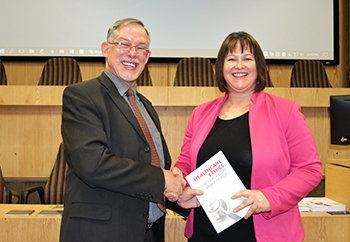Latest News Archive
Please select Category, Year, and then Month to display items
12 October 2020
|
Story Arina Engelbrecht
|
Photo Supplied
 Arina Engelbrecht from Organisational Development and Employee Well-being believes physical activity has a number of benefits for one’s health, including stress relief.
Arina Engelbrecht from Organisational Development and Employee Well-being believes physical activity has a number of benefits for one’s health, including stress relief.
Being physically active plays a big role in preventing the development of mental-health problems and in improving the quality of life of people experiencing mental-health problems.
Treatment for depression
Physical activity can be an alternative treatment for depression. It can be used as a stand-alone treatment or in combination with medication and/or psychological therapy. It promotes all kinds of changes in the brain, including neural growth, reduced inflammation, and new activity patterns are formed that promote feelings of calm and well-being. It releases endorphins – powerful chemicals in the brain that energise your spirit and make you feel good.
Physical activity can be very effective in relieving stress. Research in adults has found that physically active individuals tend to have lower stress levels compared to individuals who are less active. It also leads to improved sleep. When a person sleeps better and feels more rested, overall quality of life improves. They cope better with daily life stressors.
Reduce Alzheimer's risk
Regular physical activity can reduce your risk of developing Alzheimer's disease by up to 50%. It can also slow down further deterioration in those who have already started to develop cognitive problems. It stimulates the brain’s ability to maintain old connections as well as to make new ones.
A study asked people to rate their mood immediately after periods of physical activity (e.g. going for a walk/run, cycling, doing housework) and periods of inactivity (e.g. reading a book or watching television). Researchers found that participants felt more content, more awake, and calmer after being physically active compared to after periods of inactivity.
In conclusion, people who are physically active feel a sense of well-being, feel more energetic throughout the day, sleep better at night, have sharper memories, and feel more relaxed and positive about themselves and their lives.
“Being physically active not only changes your body, it changes your mind,
attitude, and your mood.” – Arina Engelbrecht
Ethics at the heart of healthcare practice
2017-05-17

Prof Gert van Zyl during the launch of Health
Ethics for Healthcare Practitioners with
Prof Laetus Lategan at the Central
University of Technology.
Photo: Supplied
The Central University of Technology (CUT) in partnership with the University of the Free State (UFS) launched a newly published book: Health Ethics for Healthcare Practitioners that aims to raise awareness among healthcare practitioners and patients about various unethical challenges faced by healthcare services in both the private and public sectors.
Prof Laetus Lategan, Director of Research Development and Postgraduate Studies at CUT, and Prof Gert van Zyl, Dean of the UFS Faculty of Health Sciences, are the co-editors of the book intended to provide a moral guide to healthcare professionals when dealing with their patients.
Holistic approach to healthcare practice
Their work places renewed emphasis on the importance of healthcare ethics. This is due to a diversifying range of healthcare services and the imminent collapse of the public healthcare service sector; most notably in developing countries. The authors particularly focus on how their findings can be integrated into real-life situations.
The book looks at modern-day healthcare ethics and how they apply to both patients and healthcare practitioners including doctors, professional nurses and therapists. It is an elaborate reference book that will help healthcare practitioners to make informed decisions should they be faced with ethical dilemmas in their practices and assist them to gain a better understanding and devise solutions to problems faced by communities.
Academic journey and partnerships forged
Prof Van Zyl said the book had been a joyful journey of collaboration between the two universities, a journey of academic colleagues who become friends. He explained that they wanted to focus on creating new approaches to healthcare from an ethical perspective, to provide a guide and reference on ethics, not only to healthcare practitioners, but also to patients. “We hope this book will make a difference in healthcare delivery,” he concluded.
Prof Lategan said modern science needed to become more interdisciplinary, which would transcend the way science was conceived. “The essence of healthcare is to be of service to other people and have relationships with other people. I think it’s high time for us to start caring for one another, especially in the academic environment. If we are really looking after the health of other people, whether it is mental, spiritual or physical health, it starts with caring for other people.”